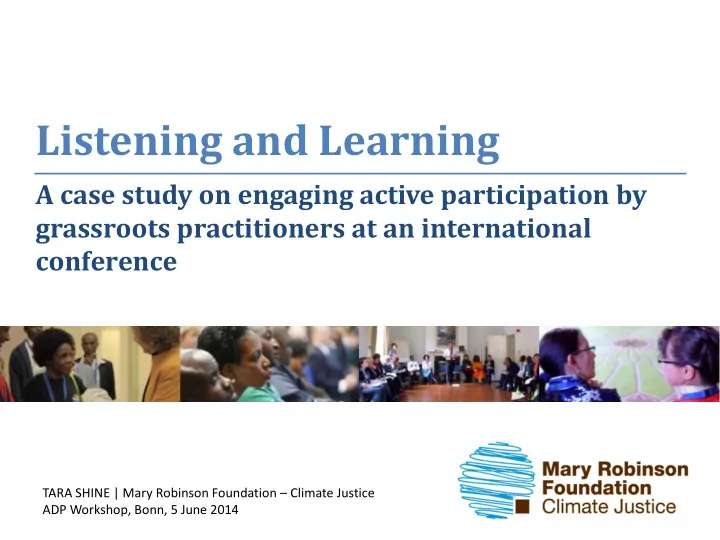

Listening and Learning A case study on engaging active participation by grassroots practitioners at an international conference TARA SHINE | Mary Robinson Foundation – Climate Justice ADP Workshop, Bonn, 5 June 2014
Climate Justice • Climate justice links human rights and development to achieve a human-centred approach, safeguarding the rights of the most vulnerable and sharing the burdens and benefits of climate change and its resolution equitably and fairly. • The work of the Mary Robinson Foundation – Climate Justice is informed by the Principles of Climate Justice: – Respect and Protect Human Rights – Support the Right to Development – Share Benefits and Burdens Equitably – Ensure that Decisions on Climate Change are Participatory, Transparent and Accountable – Highlight Gender Equality and Equity – Harness the Transformative Power of Education for Climate Stewardship – Use Effective Partnerships to Secure Climate Justice TARA SHINE Mary Robinson Foundation – Climate Justice
Participation – the Climate Justice Approach • Principle of Climate Justice: Ensure that Decisions on Climate Change are Participatory, Transparent and Accountable. • The opportunity to participate in decision- making processes which are fair, accountable, open and corruption-free is essential to climate justice. • The voices of the most vulnerable to climate change must be heard and acted upon. TARA SHINE Mary Robinson Foundation – Climate Justice
Why Participation? • Full participation allows all voices to be heard – from key global decision makers to marginalised community members. • Improving awareness and understanding of climate change is key to winning public support for climate related policies. • The UNFCCC, through Article 6, calls on governments to educate, empower and engage all stakeholders and major groups on policies relating to climate change. • Grassroots practitioners and vulnerable communities cannot engage in the global climate negotiations if they don’t know about them. • Widespread participation also allows these policy makers to learn from the people their decisions affect the most. TARA SHINE Mary Robinson Foundation – Climate Justice
Hunger • Nutrition • Climate Justice • Held in April 2013, and co-hosted by the Foundation and the Irish Government • Participation in action • 300 delegates, 100 of which represented grassroots communities across the world • The conference sought to amplify the voices of those most affected by climate change – voices which are all too often ignored by global policy makers. TARA SHINE Mary Robinson Foundation – Climate Justice
Lessons Learned • Bringing grassroots practitioners and policy makers together works Grassroots representatives have the knowledge and ability to solve problems relating to climate change in their own areas Bridging between these groups can inform effective climate solutions. TARA SHINE Mary Robinson Foundation – Climate Justice
Lessons Learned • The capacity of grassroots representatives needs to strengthened to enable them to engage. Policy makers need to take the time to ensure grassroots communities are engaged and aware of the processes in train in climate and development negotiations. Grassroots practitioners have knowledge and skills to share. High level policy makers have a responsibility to amplify their voices and empower them to tell their stories. TARA SHINE Mary Robinson Foundation – Climate Justice
Lessons Learned • • Women are at the Strengthening institutions and heart of effective establishing solutions – there platforms for real can be no real dialogue among all solutions without stakeholders is women’s necessary to involvement. catalyse change. Women made up 46% of conference Real dialogue delegates achieved using Equal rights are accessible essential for language and women’s inclusion innovative means of in these solutions communication. TARA SHINE Mary Robinson Foundation – Climate Justice
Lessons Learned • The negative impact of climate change on the food and nutrition security of vulnerable households is an injustice, as they have done least to cause climate change. • We should not be afraid to empower people and protect rights. Giving power to another can lead to positive change. • By placing people at the centre, the clearest picture of the crisis facing the world’s most vulnerable emerges. TARA SHINE Mary Robinson Foundation – Climate Justice
Recommend
More recommend